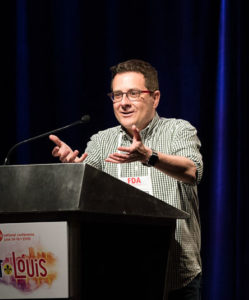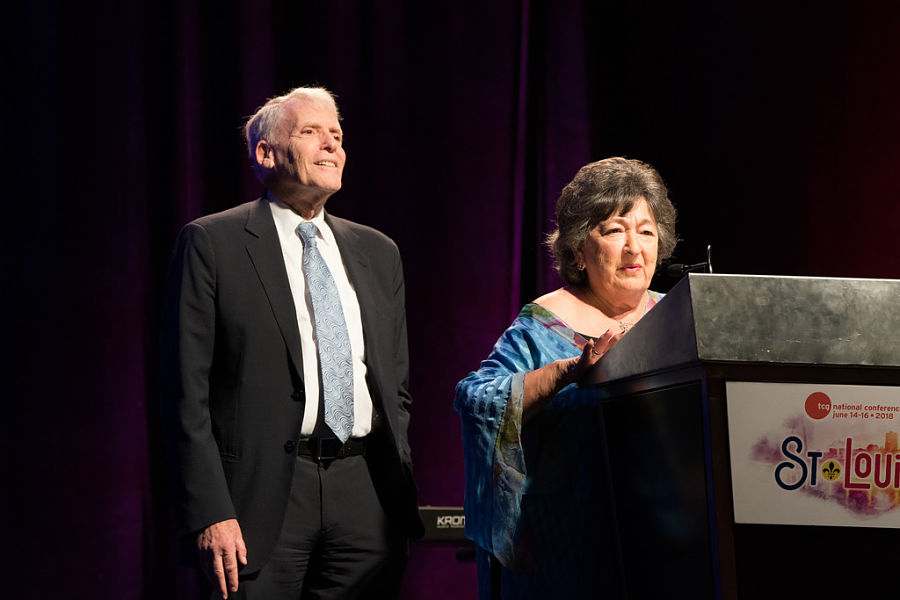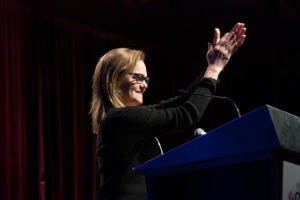ST. LOUIS: According to Teresa Eyring, executive director of Theatre Communications Group, the TCG 2018 conference ended how it began: celebrating the creative energy of St. Louis.
The conference’s final plenary on Saturday afternoon opened with Kevin Moriarty, artistic director of Dallas Theater Center and president of TCG’s board of directors, thanking attendees for their participation in a Friday town hall meeting about sexual harassment and assault in the theatre community, and in a “How We Move Forward” earlier that day, which addressed a protest Friday night at the St. Louis Muny. Its production of the musical revue Jerome Robbins’ Broadway, activists pointed out and explained, included instances of yellowface, redface, and brownface (white actors portraying other cultures).
“It’s because of the strength and solidarity that all of you have brought to bear in and around this conference that we can have hope that we can create a better American theatre,” Moriarty said. “And in doing that, we can better serve our country and make her a better place for all of us.”

He also encouraged artists to stay politically involved, noting that the National Endowment for the Arts and the National Endowment for the Humanities both have budget increases pending in Congress. “We have bipartisan support for the arts in our country because there are people in every single congressional district in America who say to their representative, ‘My country is better, stronger, and healthier because of the arts,’” Moriarty said.
TCG then presented the Local Funder Award to the St. Louis–based Kranzberg Arts Foundation, a community-driven arts foundation. Rick Dildine, former director of Shakespeare Festival St. Louis and the current director of Alabama Shakespeare Festival, presented the award to Ken and Nancy Kranzberg, trustees of the Kranzberg Arts Foundation, whom Dildine called “the biggest cheerleaders for the arts in St. Louis—they show up.”
Overseen by executive director Chris Hansen, the Kranzberg Arts Foundation provides space and support for musicians, artists, theatres, and others in the St. Louis community. Among the many spaces where they incubate art and artists is .ZACK, where TCG’s late night party was held the night before. The Kranzberg Arts Foundation presents more than 15 visual art exhibits per year, has 9 music artists in residence, and provides an artistic home to more than 33 resident arts organizations within its portfolio of mixed-use space throughout St. Louis.
“All I really want to say,” said Nancy Kranzberg, “is that Ken and I are thrilled not only to receive this award, but also because we think St. Louis is the most culturally rich city in the country, per capita.”

Conferencegoers were then given a chance to sample some of that rich culture, with three excerpts from local St. Louis productions. First was the opening of Blow, Winds, an adaptation of Shakespeare’s King Lear that addresses issues specific to the St. Louis community. The show is part of Shakespeare Festival St. Louis’ Shakespeare in the Streets project, which since 2012 has adapted a different play to reflect a St. Louis neighborhood, then staged in it the streets of that neighborhood. Blow, Winds, which was written by Nancy Bell and Mariah Richardson and had its closing night on Saturday after the plenary, included original music from Lamar Harris and pounding dance numbers from the Gentlemen of Vision step team.
The next excerpt was from Luchadora!, a show by Alvaro Saar Rios for young audiences about a young woman who learns that her father was once a professional Mexican wrestler, or luchador. Plagued by back problems, he has been called out of retirement by the braggadocious El Hijo (played by TCG Rising Leader of Color Carl Overly Jr.), but his daughter decides—at first against his wishes, then with her father’s blessing—to take his place.
Anna Skidis Vargas, artistic director of Theatre Nuevo, directed the production. Vargas is also a TCG Rising Leader of Color, along with Gabe Taylor, the show’s assistant director and stage manager. (Jacqueline Thompson, associate director for Blow, Winds, is also part of the RLC3 cohort.)
The final excerpt was from The Gringo, a new musical from by Colin Healy, which will debut in August at the St. Lou Fringe Festival. Set in Miami’s Overtown neighborhood, the show is about El Fantasma, a street artist gunned down by police, and the talented white artist who confronts his own white privilege and other issues when he starts doing street art.
After the performances, the artists sat down for a roundtable discussion with Seth Gordon, associate artistic director for the Rep in St. Louis. One of his final questions was about what it’s like to be an artist working in St. Louis.
Many of the artists on stage echoed Vargas’s answer. “It’s a struggle to be an artist here,” she said. “There are some companies, and you know that you shouldn’t even audition for them. As soon as you walk in the room it’s a no.”
“It’s hard to be a citizen of St. Louis, much less an artist,” echoed Adam Flores, assistant professor of theatre at Fontbonne University and a member of the artistic board at Mustard Seed Theatre, which co-staged Luchadora! with Theatre Nuevo. (He also played the fool in Blow, Winds.)
Still, both agreed that creating art here was worth it, and that they were committed to changing their communities through art. “It is very necessary work here,” Vargas said.
Before the plenary ended, Eyring took the stage to offer some final thoughts on a conference that offered many opportunities for emotionally intense discussions and reflective moments.

“St. Louis is a city that resists a single narrative,” she said. “It’s a place of many stories.” She offered up one more, told to her by Lois D. Conley, the founder of the Griot Museum of Black History. It was about Percy Green, an activist who in 1964 climbed the unfinished Gateway Arch to protest the unions building it, which had no people of color in them.
He and white student Richard Daly stayed up on the Arch for four hours while supporters cheered and detractors jeered. Their action eventually led to a lawsuit being filed against exclusionary unions.
“We aren’t so different from that unfinished arch,” Eyring said. Some are climbing it to dismantle systems of white supremacy, some are acting as supporters, others as detractors and doubters. Still others remain silent and don’t know where they fit. But wherever you fit on that spectrum, Eyring exhorted, “We need to work together to dismantle those foundations.”
She then announced that the next conference would be in Miami, June 5-7, 2019, where, she hoped, “Maybe we’ll find some more of us climbing up the unfinished arch of our profession.”


